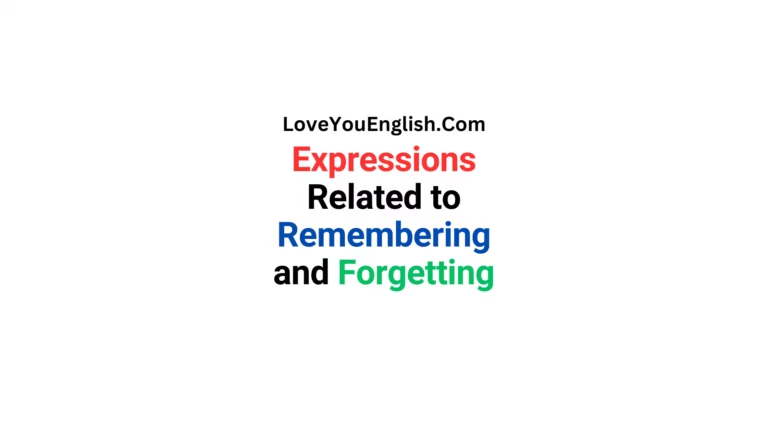Understanding Daily Activities English Idioms
English idioms are a natural part of daily communication, and many of them are based on everyday activities such as work, routine tasks, and daily habits. These idioms may sound confusing at first, but once you understand their meanings, they become easy and fun to use in conversation.
In this lesson, “Understanding Daily Activities English Idioms,” you will learn common idioms related to daily life along with clear explanations. These idioms are frequently used by native speakers in spoken English, movies, workplaces, and informal conversations.
Whether you are a student, ESL learner, or English teacher, this guide will help you understand daily-activity idioms better and use them confidently to sound more natural in English.
This topic is part of our English Idioms & Phrases for English learners.
1. Break the Ice
Meaning:
To “break the ice” means to make people feel more comfortable in a social situation, especially when they don’t know each other very well.
How to Use:
Imagine you’re at a party and everyone seems shy. You might start a fun game or tell a funny story to “break the ice” and help everyone relax.
Example: “To break the ice, Jane started telling jokes as soon as the guests arrived.”
Why It’s Useful:
This idiom is perfect for social situations where people might be nervous or quiet. It helps to create a friendly atmosphere.
2. Get a Fresh Start
Meaning:
To “get a fresh start” means to begin something again in a new and better way.
How to Use:
If you’re starting a new job or moving to a new city, you might want a “fresh start” to leave past troubles behind and begin anew.
Example: “After a tough year, Sam decided to get a fresh start by moving to a new town.”
Why It’s Useful:
This idiom helps express the idea of new beginnings and leaving old problems behind.
3. Hit the Hay
Meaning:
To “hit the hay” means to go to bed or to sleep.
How to Use:
If you’re tired at the end of the day, you might say it’s time to “hit the hay.”
Example: “I’m exhausted from work. I think I’ll hit the hay early tonight.”
Why It’s Useful:
This is a casual way to talk about going to bed. It’s often used at the end of the day when you’re ready to sleep.
4. In the Same Boat
Meaning:
To be “in the same boat” means to be in the same difficult situation as someone else.
How to Use:
If you and your friend are both dealing with a tough situation, you can say you’re “in the same boat.”
Example: “We’re both studying for exams, so we’re in the same boat.”
Why It’s Useful:
This idiom helps to express shared experiences or problems, making you feel less alone.
5. Burn the Midnight Oil
Meaning:
To “burn the midnight oil” means to stay up late working on something.
How to Use:
If you’re working late into the night, you are “burning the midnight oil.”
Example: “I have a big project due tomorrow, so I’ll be burning the midnight oil tonight.”
Why It’s Useful:
This idiom describes late-night work and effort, often when preparing for an important task.
6. Take It Easy
Meaning:
To “take it easy” means to relax and not worry too much.
How to Use:
If you’ve been stressed out, you might remind yourself or others to “take it easy.”
Example: “You’ve been working hard all week. It’s time to take it easy this weekend.”
Why It’s Useful:
This idiom is helpful for reminding yourself or others to relax and not stress out.
7. Keep Your Head Up
Meaning:
To “keep your head up” means to stay positive even when things are tough.
How to Use:
If you’re facing challenges, a friend might tell you to “keep your head up.”
Example: “I know the job search is hard, but keep your head up. You’ll find something soon.”
Why It’s Useful:
This idiom offers encouragement and support during difficult times.
8. Give Someone a Hand
Meaning:
To “give someone a hand” means to help them.
How to Use:
If a friend needs help with a task, you can offer to “give them a hand.”
Example: “Can you give me a hand with these boxes? I’m moving to a new apartment.”
Why It’s Useful:
This is a friendly way to offer help in various situations.
9. On the Same Page
Meaning:
To be “on the same page” means to agree or have the same understanding about something.
How to Use:
If you and your colleague have the same goals for a project, you’re “on the same page.”
Example: “Before we start the project, let’s make sure we’re on the same page.”
Why It’s Useful:
This idiom is great for making sure everyone understands and agrees on a plan.
10. Go the Extra Mile
Meaning:
To “go the extra mile” means to do more than what is expected or required.
How to Use:
If you work hard on a project and put in extra effort, you’re “going the extra mile.”
Example: “She always goes the extra mile for her clients to ensure they’re satisfied.”
Why It’s Useful:
This idiom is used to praise someone who puts in extra effort and does more than the minimum.
11. Let the Cat Out of the Bag
Meaning:
To “let the cat out of the bag” means to accidentally reveal a secret.
How to Use:
If you accidentally tell someone a surprise before it’s supposed to be revealed, you “let the cat out of the bag.”
Example: “I didn’t mean to let the cat out of the bag about the surprise party.”
Why It’s Useful:
This idiom describes the situation when a secret is unintentionally revealed.
12. Put Your Feet Up
Meaning:
To “put your feet up” means to relax and take a break.
How to Use:
After a long day, you might “put your feet up” and enjoy some rest.
Example: “After the meeting, I’m going to put my feet up and watch some TV.”
Why It’s Useful:
This idiom is perfect for describing moments of relaxation and rest.
13. Get the Ball Rolling
Meaning:
To “get the ball rolling” means to start something and make progress.
How to Use:
If you start a new project, you’re “getting the ball rolling.”
Example: “Let’s get the ball rolling on the new marketing campaign.”
Why It’s Useful:
This idiom is used to talk about beginning a project or process.
14. Take the Plunge
Meaning:
To “take the plunge” means to make a big decision or start something new, even if it’s risky.
How to Use:
If you decide to try something new, you’re “taking the plunge.”
Example: “I finally took the plunge and signed up for that cooking class.”
Why It’s Useful:
This idiom helps express the idea of taking risks for new opportunities.
15. Bite the Bullet
Meaning:
To “bite the bullet” means to face a difficult or unpleasant situation with courage.
How to Use:
If you need to handle something tough but necessary, you “bite the bullet.”
Example: “I didn’t want to go to the dentist, but I had to bite the bullet.”
Why It’s Useful:
This idiom describes facing tough situations with bravery.
16. Under the Weather
Meaning:
To be “under the weather” means to be sick or unwell.
How to Use:
If you’re feeling ill, you might say you’re “under the weather.”
Example: “I’m not coming to work today because I’m feeling under the weather.”
Why It’s Useful:
This idiom is a gentle way to say you’re not feeling well.
17. Call It a Day
Meaning:
To “call it a day” means to stop working for the day.
How to Use:
When you finish your work for the day, you might “call it a day.”
Example: “We’ve been working for hours. Let’s call it a day and finish the rest tomorrow.”
Why It’s Useful:
This idiom helps you express the end of your workday or task.
18. Hit the Nail on the Head
Meaning:
To “hit the nail on the head” means to say or do something exactly right.
How to Use:
If you solve a problem perfectly, you “hit the nail on the head.”
Example: “You hit the nail on the head with your suggestion for improving the process.”
Why It’s Useful:
This idiom is used to praise someone for being accurate or insightful.
19. Put Something on the Back Burner
Meaning:
To “put something on the back burner” means to delay dealing with something until later.
How to Use:
If you decide to postpone a task, you’re “putting it on the back burner.”
Example: “I have to put the home renovation on the back burner until after the holidays.”
Why It’s Useful:
This idiom helps explain that something will be dealt with at a later time.
20. A Piece of Cake
Meaning:
To say something is “a piece of cake” means it is very easy to do.
How to Use:
If a task is simple, you might say it’s “a piece of cake.”
Example: “The test was a piece of cake. I finished it in half the time.”
Why It’s Useful:
This idiom is used to describe tasks or situations that are easy.
Conclusion
Learning idioms can make your language more interesting.
By understanding these common phrases, you can talk better with English speakers.
Idioms cover many different situations, so you can express yourself in lots of ways.
Practice using idioms when you talk to people.
It will make your words sound better and help you make friends.
Keep practicing, and soon you’ll use idioms without even thinking about it!
If you liked learning about idioms, watch out for more language tips. Have fun learning idioms!
Explore more English idioms here:
- 50 English Idioms for Competitive Exams
- 20 Simple English Idioms for Class 5 Students with Meanings
- 25+ English Slang Words for Drinks: Fun Phrases You Should Know
- English for Shopping: How to Ask Questions and Understand Prices
- Master English for Calls and Messages






